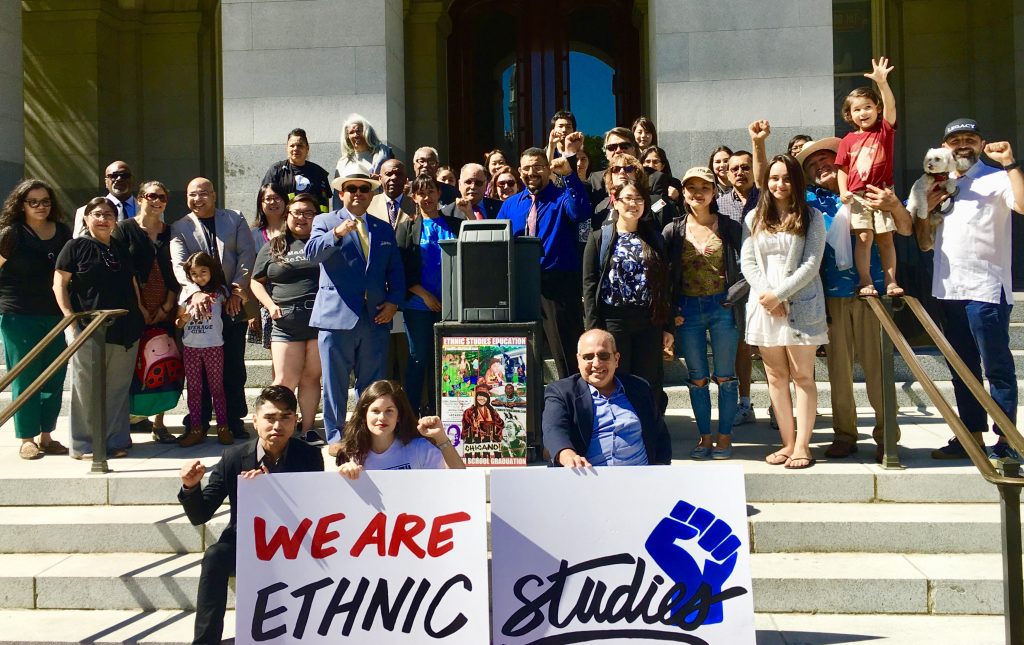The California State University Board of Trustees moved one step closer Tuesday to requiring students take an ethnic studies and social justice course to graduate.
The trustees’ Committee on Education Policy voted 10-2 for a new general education requirement that would mandate students who enter the 23 campuses in 2023-24 enroll in a 3-unit ethnic studies and social justice class. Those classes could include one of the four traditional ethnic studies disciplines: Native American studies, African American studies, Asian American studies or Latina and Latino studies. But also classes that explore other historically-oppressed communities, such as Muslim, LGBTQ or Jewish studies.
The full board will vote on the proposal Wednesday.
The proposal, however, has faced opposition from the California Faculty Association, the union representing CSU faculty, and at least 20 legislators who instead hoped the trustees would support Assembly Bill 1460 which would limit the ethnic studies course options.
Many of the trustees expressed displeasure with the legislature’s decision to make curriculum changes in the CSU and felt the proposal was needed to give Newsom options.
“If we don’t vote to approve this proposal, we’re ceding to the legislature the right to create policy about what we teach,” Board Chair Lillian Kimbell said. “This is in some ways a protest against that. If we don’t go ahead and vote and pass, we will not have been heard.”
Last month the state Senate passed AB 1460, which would require students beginning with those graduating in 2024-25 to take a 3-unit class in one of four ethnic studies disciplines: Native American studies, African American studies, Asian American studies or Latina and Latino studies. The bill, authored by Assemblymember Shirley Weber, was passed by the Assembly last year. It is still sitting in the Assembly, which will take a final vote to approve minor amendments made by the Senate July 27. It then will head to Gov. Gavin Newsom, who can sign it into law.
The faculty union, lawmakers and some students worried that the inclusion of other classes under the label, “social justice,” would “water down” the need for all students to take classes that focus on people who have historically faced racism, such as Blacks, Latinos and Native Americans. The CSU proposal, for example, would allow a wide range of other disciplines, including humanities, arts and social sciences, as long as they have a social justice component. The courses could focus on subjects including class, gender, sexuality, religion or immigration.
“I want students to have a choice within broad parameters,” CSU Chancellor Tim White said. “Some will choose ethnic studies, some will choose Jewish studies or LGBTQ courses because they want to learn about individuals in that community who have been oppressed. Student choice matters to me.”
While the idea of requiring students to study the contributions of nonwhite ethnic and racial groups has been long-standing in California, the latest push is happening amid nationwide anti-racism protests and calls for systemic change ignited by the police killing of George Floyd.
In a letter to White, 20 lawmakers urged action to require an ethnic studies course: “The tragic disparities revealed in the worse outcomes of Covid-19, and the brutal public murder of George Floyd, cry out for change in all of our institutions.” They noted that CSU’s ethnic studies departments five years ago proposed to require such a course and nothing occurred.
CSU has long been a leader in offering students an ethnic studies curriculum. The College of Ethnic Studies at San Francisco State became the first college of its kind in the United States when it was established in 1969. Cal State Los Angeles in 1968 created the first Chicano studies program in the nation. In 2014, CSU charged a task force with making suggestions to further advance ethnic studies across the system, and that committee in 2016 recommended a requirement for students to take a class in ethnic studies.
To get more reports like this one, click here to sign up for EdSource’s no-cost daily email on latest developments in education.
